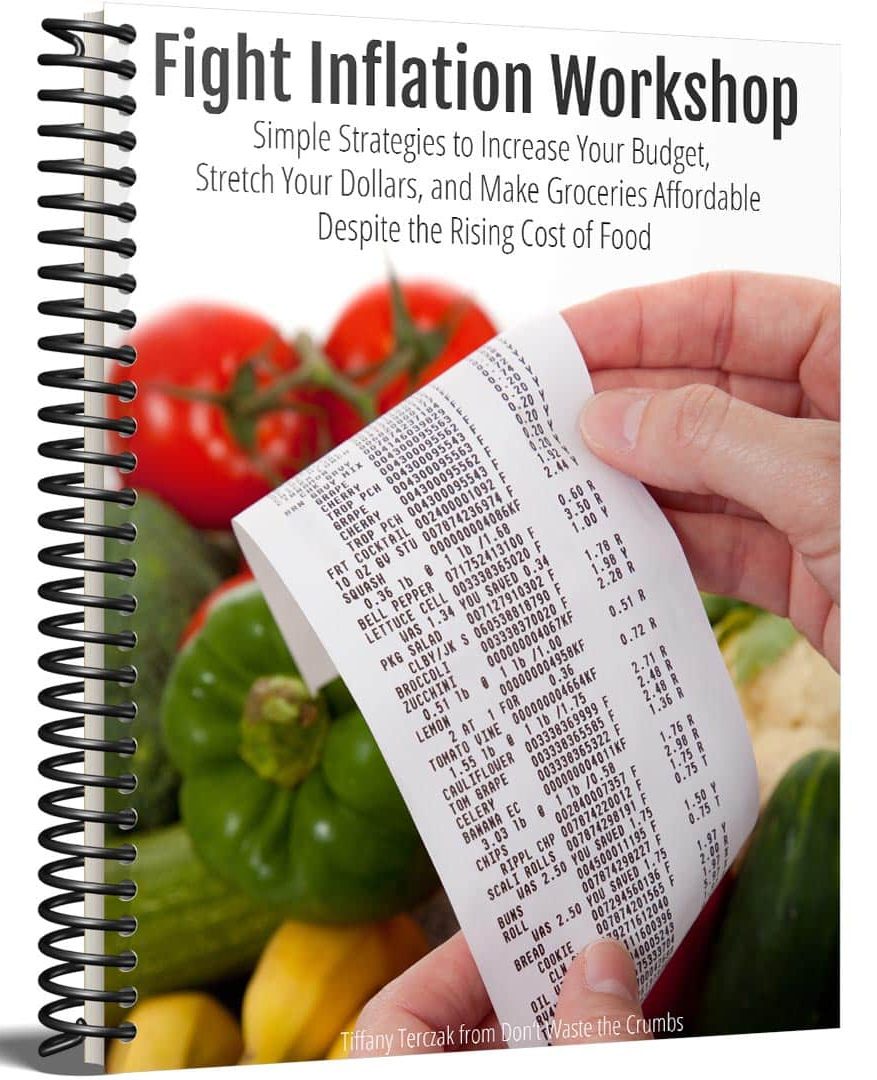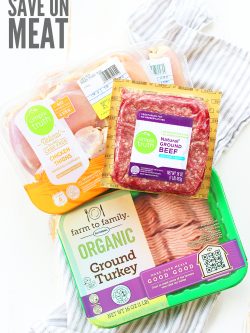Is your grocery spending out of control? Here’s how to make a grocery budget (and stick with it!). Figure out how much you should spend on groceries, plus my best strategies to save on food.

Several years ago my husband and I cut our monthly expenses in half. We set a monthly grocery budget of $330 for the two of us based on what we were spending.
And now that we’re a family of four, with a teen and a preteen, we are still able to maintain our grocery budget at around $400 per month.
I’ve learned over the years that guessing and assuming when it comes to the budget won’t work. Coming up with a number for a frugal grocery budget cannot be random. In fact, it must be strategic!
WHY MAKE A FRUGAL GROCERY BUDGET
The simple reason to create a frugal grocery budget is to save money. What you do with the money you save is entirely up to you!
- Our “one-day” dream was to buy a house with cash, and you know what? We did it!
- Maybe your dream is to pay for your kids’ college so they don’t have to take on student loans
- Or save up for a new-to-you car
- Or to build an emergency fund in case of unforeseen job loss
Whatever the reason, the biggest reason to make a frugal grocery budget is to spend less on food.
HOW TO MAKE A GROCERY BUDGET
MAKE A COMMITMENT TO REDUCING YOUR FOOD BUDGET
You absolutely cannot create a frugal grocery budget, or work within a budget if you’re dead set against it. It simply will not work.
- Mentally prepare yourself first. Commit to making a food budget – no if’s, and’s or but’s allowed. There will be a cap on your spending. If you reach the bottom of the money jar before the month is over, you’ll have to learn to make do with what you have.
- Take heart: eating well with only your pantry at hand is not an impossible task. We have gone 33 days without spending any money at all.
- The whole family needs to be on the same page with the grocery bill as well. Sit down with the family to explain why it’s important to have a grocery budget, and how it will allow you to achieve your greater money goals together.
- Explain how it will help you stop living paycheck to paycheck, and how to be more mindful when grocery shopping.
Soup nights, leftovers, and meat-less meals go over much easier when the family knows the reasoning behind them.

WHAT IS A REASONABLE FOOD BUDGET PER MONTH?
How much should I budget for groceries? I get this question A LOT. And honestly, there is no right answer!
Your food budget will be unique to YOUR family, life situation, dietary needs, and where YOU live, including the stores close to YOU and the types of food that YOU like to buy.
Coming up with our $400 grocery budget wasn’t some stroke of genius. We simply tallied up our average cost of groceries and said we wouldn’t go any higher.
This is just one way to create a budget though, and it might not be the best way for you to create one. Use the scenarios below or a grocery budget calculator as guidelines to help determine how much YOU should spend on food.
SCENARIO 1: GROCERY BUDGET BASED ON FOOD COSTS
Every month the United States Department of Agriculture (USDA) publishes a report with what they think the average cost of food is for families of various ages and sizes. They break it down into four plans: Thrifty Plan, Low-Cost Plan, Moderate-Cost Plan, and Liberal Plan.
Here’s a short summary of the average family of four.
If your family has less than or more than 4 people, or if you want to know specifics for ages and genders, the report gets pretty granular. Use the most recent report to get specifics for your family.
SCENARIO 2: PERCENTAGE OF SPENDING TO DETERMINE FOOD BUDGET
To find the percentage of the money you spend on food at home:
- (One Month Post-Tax Income) – (Grocery Spending in One Month)
- Divide by One Month’s Post-Tax Income
- Minus 1
- Multiply by 100 and ignore the negative sign
This will tell you what percentage of your monthly income you’re currently spending on food, and you can decide to increase or decrease your food budget from there.
SCENARIO 3: GROCERY BUDGET BASED ON YOUR INCOME
Of all the scenarios, this one is the most important because your food budget depends on how much money you make.
A friend once said that the food you buy does not determine your grocery budget and I couldn’t agree more.
If our grocery budget is based on the quality of food we buy, we have it backward. It’s entirely contradictory to the basic rules of budgeting!
It’s like saying because you want to buy a nice big new house, you need to have a bigger paycheck. But that’s not how it works. We start with the paycheck first, and THEN we see what kind of house we can afford.
The same goes for grocery budgeting…
We start with the money we have, and THEN see what quality of food we can afford.
If you don’t like that answer and want to be able to spend more money on quality food, then find ways to save money elsewhere and put more funds toward your food bill.

OTHER FACTORS TO CONSIDER WITH YOUR FOOD EXPENSES
Even when you think you have a general idea of how much you should spend on food, there are still other factors to consider:
- Allergies (i.e. dairy-free or gluten-free)
- Dietary restrictions (i.e. no pork, undergoing a healing diet like GAPS, or when you have sensitivities to specific foods)
- Whether or not you garden, can, or preserve
- The amount of processed food you eat vs. how much real food you eat
- How many stores you can easily access
- How much are you able to cook from scratch
- Growing kids and teenagers (and their friends)
- Hosting company (and whether or not that’s included in your food budget or a separate hospitality budget)
All of these will affect whether the grocery bill goes up or down.
Remember that how much you spend on food now is not set in stone forever. You can work really hard to get it as low as possible so you can save for a house, a new car, or boost your emergency fund. You might also have to increase your grocery budget as your family grows or the needs of your family change.
In any case, the starting point is knowing how much you have to spend on food!
HOW TO STICK TO YOUR FOOD BUDGET
Now that you have your food budget figured out, you need to stick to it! These strategies can help you keep your spending in check.
- Keep track of your spending. Continue to gather your receipts and note what you’re spending.
- Review your spending habits every week. Add up what you’ve spent so far for the month, and subtract that from your frugal grocery budget – will you make it to the end of the month based on what’s left?
- Hold yourself accountable. Keep your family in the loop. Together you can work towards sticking to your grocery budget, and you can celebrate when you do!
- Make a meal plan. Meal plans can make or break your grocery budget. Everything you buy should have a purpose, and by planning strategically, you can save on food and come in under budget. Just don’t forget to stick to the grocery list!
- Be willing to cook from scratch. You don’t necessarily have to make EVERYTHING from scratch but making SOMETHING from scratch in order to save a few dollars will go a long way. Start with this list.
- Postpone shopping by one day. This is a mental trick because most of us have enough food to get through one more day. Get creative – can you make it another day? How about another? You might be surprised how long you can put off a trip to the grocery store.
- Know when to cut corners. Little cheats like not adding shredded cheese on top of a dish, stretching ground beef with minced vegetables or lentils, or even making no-yeast bread instead of biscuits to save the butter can all add up to savings each month.
- Shop less often. Fewer trips to grocery stores mean fewer impulse buys.
- Check the clearance rack first. See if any of your usual buys are on sale, or if there’s something you can substitute for an item on your list.
- Eat from the pantry as often as possible. If you already have it in your house, you might as well eat it. And anything you’ve already paid for doesn’t add an expense to your current grocery budget.

LOWER YOUR GROCERY SPENDING
Beyond sticking to your grocery budget, you may also want to consider ways to save on groceries and lower your spending even more. This doesn’t happen overnight, so be prepared for the long haul.
There are many ways to reduce your grocery spending, like monthly meal planning with seasonal produce, cooking from scratch, buying in bulk, and using coupons and rebate apps (although I have chosen not to use coupons anymore). But here are some “out of the box” ways you can cut your spending:
- Categorize your spending. Do this according to the foods you bought and eliminate anything that didn’t fall into a major food group.
- Stop buying food when you’re doing other things. (i.e. a bag of popcorn while browsing Target, coffee from Starbucks while running errands)
- Conduct a pantry inventory. Include your fridge and freezer inventory. This is so you can see how much food you ALREADY have before you go shopping again.
- Avoid food waste. Wasting food is throwing away money. You can even avoid waste by using up food scraps.
- Stretch cuts of meat into more meals. Stretch chicken into 7 meals, a pork loin into 7 meals, and 2 pounds of ground beef into 8 meals!
- Cutting back on meat means you are eating more fruits and veggies. This, in turn, means you’re eating healthier!
- Keep your pantry stocked with real foods. Keeping real food on hand helps you have the ingredients you need to make a tasty meal. Then you’re not tempted to buy junk or eat out.
- Start a price book. Creating a simple price book can save a lot – HUNDREDS of dollars a year.
- Focus on reducing the cost of one food group. Start with coffee, cheese, milk, dairy, produce, or meat.
- Substitute expensive items for things that cost less. Making food substitutions is the first thing I have my Grocery Budget Bootcamp students do. Many save up to $100 the first week!

DO YOU NEED SOME HELP WITH YOUR GROCERY BUDGET TODAY?
There is no better time than right now, to start using the above strategies to create your frugal grocery budget! But if you need more help, I invite you to join the waitlist for my flagship course, Grocery Budget Bootcamp. Enrollment is currently closed, but you can join my FREE 5-day Crush Inflation Challenge and start saving money on groceries tomorrow!
- In this course, I teach my strategic system of making healthy food work within your budget, plus so much more!
- It’s very much like a college class, so enrollment is only open twice a year. You can either register for the course or join the wait list on this page.
- As of this writing, my students have collectively saved over $20 million dollars. THAT’S A LOT OF MONEY!
You can get your piece of the pie – just register for Grocery Budget Bootcamp, or sign up to be notified when enrollment is open!
MORE GROCERY BUDGETING TIPS
- How to Make a Meal Plan that Works
- How to Budget for Bulk Purchases
- The Secret to a Healthy Grocery Budget
- How to Save Money with a Pantry Challenge
- 5 Fail-Proof Ways to Reduce Grocery Spending
- Eating Real Food on a Budget








Lots of suggestions, my wife and I will start on $ tracking during our next grocery store shopping trip.
Hi Greg!
Great! We wish you the best of success with your grocery budgeting. 🙂
Does this grocery budget include things like pet food / litter, medications, toiletries, paper products & cleaning supplies? For 2 of us in Buffalo, NY, we can spend up to $650 / month on groceries, including these things (and that is down now that we’ve started going to Aldi and buying more from Walmart).
I used to go the 1st of the month or the 1st Monday if the 1st fell on a weekend with my mother – in – law and do a “comprehensive grocery shop.” I took the day without pay and spent 4 – 5 hours. It was typically limited to 4 stores: Aldi, Save – a – Lot, Wegmans and TOPS, and later in the week I would go to Walmart as well. Sometimes we’d go to K Mart, Target, Market in the Square, the pharmacies and / or dollar stores too. I’d supplement with buying milk, work lunches and produce the last 3 weeks of the month, or any staples or items needed for meals that we’d run out of. I kept an “Expiring List” posted on my fridge of everything that would go throughout the month and made a “Meals List” based on that. I replaced the items from the “expiring List” the next month.
Then my mother – in – law passed away and I was on my own for everything and had to work those days when I could. But despite that, our grocery bill has gone down – even changing from cheap cat food to Blue. Now that I’ve been “let go” from my job, am moving, and starting my own promotion, I could stand to cut costs even more any way(s) I can.
My mom’s best friend lived in Florida, now Ohio, and she swears by Dollar Tree dinners – egg rolls, fried rice, etc.
Hi Jayna! In order to get your expenses under control, I recommend that your grocery budget be comprised strictly of food, not pet supplies or medication or household items – those should all have their own line items in your budget.
I’m also in Buffalo ny and we’re starting to budget our grocery bills and the first thing that needs to go is Wegmans. I love it but it’s so expensive and it’s probably the reason we have such a huge bill. Good luck with your budget!
I love this and wish we could apply it. We have 3 boys and all with allergies. Eating cheap or in bulk is not possible. I’ve tried it multiple times. We can’t eat: corn, soy, oats, wheat, gluten, strawberries, dairy, pears, avocados, lemon, peanuts or walnuts 🙁
I have to respectfully disagree Vennesssa. I have over 2,000 members in my course Grocery Budget Bootcamp and MANY of them suffer from food allergies. If you have a proven strategy that works, you can make it happens!
I started tracking my spending on food this month and I am absolutely gobsmacked by the results.We are a family of two adults, a dog, a cat and an occasional homeless friend who pops in weekly. My food bill is over $ 630.00 per month plus another $112.00 eating out. I shop at discount stores and try to eat mostly organics. I can’t believe I am spending this much on food. The only thing I can think of is I like to experiment with ethnic foods.So I have a lot of spices according to what country I’m craving for the week. Last week it was experimenting with Seitan. This week it was Persian gormeh szabzi. I even cut way back on meat this month and yet, my food bill seems astronomical. I thought I was very frugal but apparently I’m not when I compare myself to the people on this site. Another wild card is my vegan brother whose belly never seems satisfied. He stares in the refrigerator looking for some nonexistant foodstuff. Help!
When you say Groceries what do you mean? I always include cleaners, supplies and dog food in my “Groceries”. Should I be making a separate budget for these things?
Groceries are the foods you buy to eat… unless you eat cleaners, aluminum foil and dog food, they should be separate. 😉
I don’t know where I’m going wrong. I’m almost to ashamed to say this but this is the first time in my life I’ve tried to do a budget. I’ve been out of work since Jan 30. I have a new job but have no idea when I’ll get paid (I haven’t started yet). My 21 yr/old son lives with me. We are REALLY trying to do the ketogenic diet which means 20 carbs or less per day. So, I have lots of meat, eggs and cheese. I suppose these are some of the most expensive things at the grocery store. I started with a month I had a job (obviously) and figured that we spent nearly $850!! I’ve not figured any other month yet but I will probably in order to get an average (ish). Oh and I bought a new car last June. If I’d only known!!! I had no car payment prior to buying the car. My first goal will start the day I get paid. I will not spend more than $600 the first month. Goal will be 400-500. One thing I guess I have to give up is buying bulk? I’m not sure. But I like getting a bargain anywhere I can. Forgot to mention we live in Oklahoma. Yes, one of the fattest (if not THE fattest) states.
Hi Nancy,
Coming from a physiology and nutrition standpoint, carbohydrates are the most readily useable energy for the body, required to burn fat and build muscle. The idea behind the ketogenic diet is for the body to go into fat burning (ketosis) directly, which sounds good at first flush, but puts strain on your organs. Doctors will not recommend it for longer than a few months, as Keto is unsafe for populations with any pancreas, liver, thyroid or gallbladder conditions. Be mindful that consuming excessive saturated fats (ie. fast food and red meat), increases a person’s risk for atherosclerosis, making them susceptible to coronary disease and heart attacks. The Canada’s Food Guide omitted dairy from the food groups and suggests half a plate of vegetables. Frozen veggies are picked at the prime and flash frozen, I would recommend those to cans, if you are trying to cut down grocery spending. There’s definitely more reading you can do on the subject to make a decision for yourself and your son. Take heart, things will get better.
Hi Tiffany,
Do you resources include wheat and dairy? We are mostly gluten and dairy free (and we only eat a few legumes – but not often). I’d love to use your resources to save on our budget. Can you advise which ones I’d gain the most from?
Tiffany, you may or may not see this comment as it is a year since this post, but I wanted to let you know it’s still helpful! We’ve had some changes in our finances and have needed to tighten up our food budget considerably. My husband is anxious about this but I feel confident that I’ll make it work so that we don’t need to turn to credit cards this winter. Thanks for your continued inspiration!
You’re so welcome Laura! Best of luck with setting your budget. If there’s anything I can do to help, please let me know! ♥
I am a grad student who spends $400 a month on just me! I’m really inspired by this blog and have been searching for concrete ways to get down to my goal of $200 ( with an extra $200 going to student loans). Thank you everyone for sharing, and for this post!
You’re very welcome J – welcome to the community!